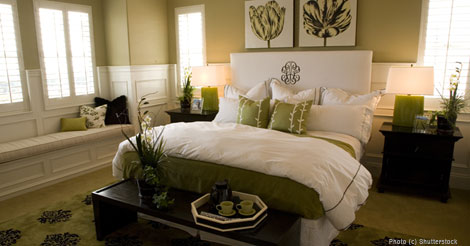|

Ten Steps to a Serene Bedroom and Sound Sleeping
Your bedroom is the place where your body is refreshed and where dreams are made. An intimate space, it should also be a healthy space. It is relatively simple to make your sleeping and loving space happier and healthier by the way you furnish and organize the room. Here are ten factors to consider when you are planning your new serene bedroom.
1. Organic cotton bedding: Sleep easier with a clean conscience and avoid pesticide residues on your sheets by using organic cotton bedding. Cotton is the world’s most heavily sprayed agricultural crop. One set of conventional queen-sized sheets requires over a pound of agricultural chemicals. But that’s not all. The fabric is sprayed with chlorine to give it a consistent color. Most sheets are sprayed with formaldehyde to reduce shrinkage and wrinkling.
2. A good bed and mattress: A good bed is another important part of a good night’s sleep. Avoid metal bed frames, which can carry magnetic fields, as well as metal-spring mattresses. Conventional mattresses are made of plastic, foam, and polyester, which emit toxic gases. Futons made of organic cotton or hemp are preferable. Wool is another healthy choice; its fibers contain air, which provides a springy surface for sleeping. Wool products are naturally flame retardant, have no added chemicals, are naturally hypoallergenic, and also help eliminate dust mites. Wool also both absorbs and releases moisture efficiently, thereby maintaining your body temperature.
3. Avoid EMFs: Avoid sleeping in the midst of an electromagnetic field (EMF) by removing as many electrical devices as possible from your bedroom. Television is the most dangerous, so if you must have one in your bedroom, unplug it while you’re sleeping. An electric alarm clock should never be situated on a table beside your head. Waterbeds and electric blankets should also be avoided. Also be aware of what electrical appliances are on the other side of the wall from the head of your bed. Don't keep, charge, or even us electronic devices or cell phones in your bedroom.
4. Avoid dust mites: If you have allergies, the presence of millions of dust mites in your bed can be a major problem. A single mattress may contain two million of these microscopic critters, feeding on the dead skin that we constantly shed. Wash your bedding weekly in hot water to get rid of dust mites. Air your sheets, pillows and blankets daily, and vacuum your mattress – and the space under your bed – regularly.
5: Clean the air: You might want to use a HEPA filter to clean the air in your bedroom. Houseplants can also help clean the air.
6. Arrange your furniture for health: You might want to look into the art of feng shui in order to arrange your bedroom furniture in the best possible way. Feng shui principles dictate that your bed should be in a commanding position in the bedroom. When laying in bed, you should have full view of the door and the rest of the room, but should not be in line with the door. That means the head of the bed should not be against a wall that contains a door. Also, try not to place your bed over a garage or entrance hall. It may mean placing your bed in the corner of the bedroom, diagonally across from the door. Feng shui experts also say that mirrors in your bedroom, at least facing the bed, can disrupt a restful mood. And since feng shui suggests that bathroom plumbing drains energy, try to situate your bed so you are not looking into the bathroom when you’re in bed. Oh, and don’t put your bed under a ceiling fan or structural beam.
7. Lose the clutter: If you want to sleep well, keep your sleeping space clear of clutter. Some sleep experts say that your bedroom should be reserved for two things: sleep, and, well, you know.... Don't watch television or use your tablet before going to sleep because light – especially blue light – can make for a poor sleep. Keep furniture and decorations to a minimum. The once exception might be a water fountain if the sound is soothing. Find another place for the exercise equipment (which might end up being used as a clothes horse anyway). And for goodness sake, don't let your bedroom double as your home office.
8. Keep it dark. Blackout curtains or blinds are a great investment and will help your body move more easily into sleep mode and maintain your circadian rhythm. Night lights and clock radios can also emit enough light to disturb some people's sleep, so situate them accordingly.
9. Keep it cool. Temperature is important for optimum sleep. Make sure it's not too hot (around 65F/18C is a good temperature for sleeping). If you don't have air conditioning and live in a place where it gets hot in the summer, try to open a window, use a fan to circulate the air, wear cotton PJs (or nothing), and outfit your bed with cotton sheets. In winter, keep the thermostat low and use a winter-weight duvet.
10. Keep it quiet. If you live in a noisy area, lower the volume of outside noise with earplugs or a "white noise" appliance. Don't run the dishwasher just before bed if the sound will transfer to your bedroom. If you have to use an alarm clock, set it to music rather than a jarring bleep. Thick rugs and curtains, or heavy blinds, can also help muffle sound, but be sure to keep them free of dust.
Once you have all these issues figured out, we’re sure you will need a rest. So sweet dreams!
|

